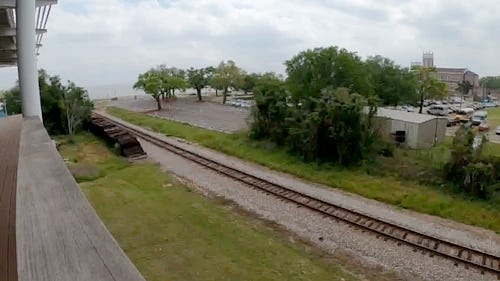🌀🗞 The FLUX Review, Ep. 54
June 2nd, 2022
Episode 54 — June 2nd, 2022 — Available at read.fluxcollective.org/p/54
Contributors to this issue: Scott Schaffter, Erika Rice Scherpelz, Justin Quimby, Neel Mehta, Boris Smus, Julka Almquist, Ben Mathes, Spencer Pitman
Additional insights from: Ade Oshineye, Gordon Brander, a.r. Routh, Stefano Mazzocchi, Dimitri Glazkov, Alex Komoroske, Robinson Eaton
We’re a ragtag band of systems thinkers who have been dedicating our early mornings to finding new lenses to help you make sense of the complex world we live in. This newsletter is a collection of patterns we’ve noticed in recent weeks.
“To explain all nature is too difficult a task for any one man or even for any one age. ‘Tis much better to do a little with certainty & leave the rest for others that come after than to explain all things by conjecture without making sure of any thing.”
― Isaac Newton
🌊🐠 Stuck in the water
“There are these two young fish swimming along and they happen to meet an older fish swimming the other way, who nods at them and says ‘Morning, boys. How’s the water?’ And the two young fish swim on for a bit, and then eventually one of them looks over at the other and goes, ‘What the hell is water?’”
— David Foster Wallace, Kenyon College’s 2005 Commencement Speech
This vignette — from a speech that is phenomenal in its own right — illustrates an interesting point: when you don’t know what lenses you’re wearing, you cannot distinguish the effect of the lens from reality.
At times we can be those fish, forgetting that even the concept of lenses is pretty revolutionary. It's non-trivial to recognize that your views are not objective reality. Your views are not a clear transmission but rather the result of your mind interpreting data through the particular refractions provided by your default lenses (generally through a few different steps).
When our lenses get “stuck to our eyeballs” because of ego, emotion, inherited culture, habit, or myriad other reasons, we can start painting others as “wrong” and ourselves as “right.” We forget that reality in a complex situation tends to not be black or white, but rather some surprising hue like purple. We forget that while we may see green, the person in other lighting might see something entirely different. While you can often talk it out with someone who “sees” green where you “see” turquoise, the further apart you are, the harder that can be.
This pattern is particularly problematic when our lens becomes our identity. It's incredibly hard to take off a lens that is fundamental to your identity. If you build your life around the view that the world is flat, it becomes a lot harder to shift that view. Even if you’re presented with concrete facts to the contrary, catching up to reality matters less than the blow to your ego, identity, and self-esteem. Sometimes people can even resort to violence when they can’t learn to see a problem differently. Dialogue should always be tried before violence.
Leaning into lenses allows you to be explicit about your intent: “I am looking through this lens, which surfaces insight X. It is, however, limited in way Y.” This approach can de-escalate conflict by reminding you that your counterpart’s views are likely less about you and more about the particular lenses they are wearing. Taking time to understand their lens and how it differs from yours and then discussing what you see can help drive you closer to a shared perspective. Imagine you and a person are in a room, trying to make sense of a strange object on the table in front of you. Neither of you can see the object clearly. But you can try to put on all different kinds of glasses to see it more clearly. Some lenses let you see the object up close, others from far away. And maybe you need to try the infrared lenses! Or the Geiger counter (a lens that detects radiation).
Lenses are a useful tool, but like anything we need to make sure we don't go to the extreme of turning our lenses into contacts — or, worse still, a permanent modification like Lasik surgery.
🛣️🚩 Signposts
Clues that point to where our changing world might lead us.
🚏🚉 Germany will temporarily cut train and bus fares 90% to save fuel
In a bid to reduce car travel, fossil fuel consumption, and reliance on Russian oil imports, Germany’s parliament has announced a plan to let residents get unlimited trips on buses, subways, local trains, and other modes of public transit for just 9 euros a month, representing a saving of 90% for the average German. The discount program will run from June to September and cost the government 2.5 billion Euros.
🚏🏜 California could lose half its hydropower this summer due to severe drought
Nearly 60% of California is facing “extreme” or “exceptional” drought this summer, and in April the volumes of the snowpacks that feed the state’s rivers were 40% lower than normal. The resulting drop in reservoir volume is projected to cut California’s hydroelectric power generation this summer nearly in half. So California (along with Washington and Oregon, which are facing similar droughts) will have to turn to natural gas to fill the hole, but this is projected to increase electricity prices in the Western US by 5% and carbon dioxide emissions among California’s energy sector by 6%.
🚏🇫🇷 French officials are banning English gaming terms from official French
The French Academy, which regulates which words are deemed “appropriate” for the French language, has long fretted about the “language degradation” that it believes comes from borrowing words, especially from English. But as video gaming has grown in popularity in France, so too have English gaming loanwords. In response, the Academy released a communiqué saying that such loanwords should be banned (at least in official government usage), in favor of phrases built out of native French words, like joueur-animateur en direct (“streamer”) or compétitions de jeux vidéo (“eSports”). This isn’t the first time the 380-year-old Academy has struggled to keep pace with internet culture: the Academy’s preferred word courriel edges out the loanword “email” in books, but “email” dominates online.
🚏🎥 Amtrak turned to Twitch streaming to settle a dispute with freight shipping firms
Amtrak, the US’s long-distance passenger rail service, wants to resume twice-daily service between Mobile, Ala. and New Orleans, which hasn’t run since Hurricane Katrina in 2005. But the two freight companies that own the rails between the two cities are refusing to let Amtrak run the passenger trains, claiming it would “impair unreasonably” freight transit along that line. Frustrated, Amtrak went on Twitch and livestreamed a video showing the near-empty railroad tracks in rural Mississippi (about halfway along the route), arguing that freight traffic is so sparse that it shouldn’t be a problem for Amtrak to run two more trains each day.
🚏🦾 Robot orders have risen 40% as manufacturers work around a tight labor market
The US labor market remains tight, with unemployment down to about 3.5% and job openings near the highest level on record. Accordingly, many manufacturers and industrial firms have increased their uptake of industrial robots and other automated technologies. Orders for workplace robots in the US increased 40% between Q1 2021 and the first quarter of this year, accelerating a long-running trend: robot sales increased 21% throughout 2021.
🚏🌿 One startup is using kelp rafts to suck carbon dioxide out of the sky
A startup out of Maine has devised a low-tech way to sequester carbon dioxide and heal the oceans to boot. It creates mini “rafts” out of waste wood and chunks of limestone, with ribbons of fast-growing kelp attached, and releases them into the ocean. The kelp grows up to two feet a day, thereby absorbing large quantities of carbon dioxide. When the raft dissolves, the kelp sinks to the bottom of the ocean, effectively removing that carbon from the carbon cycle (at least in the medium term). The dissolving limestone also creates a buffer solution that helps neutralize the ocean’s increasing acidity.
🚏🎬 An NFT-themed TV show was put on hold after its star NFT was stolen
Actor Seth Green started amassing a collection of NFTs, including a Bored Ape Yacht Club NFT. He then announced he was working on an upcoming TV show called White Horse Tavern, which featured his NFTs as cartoon characters and starred his prized Bored Ape, nicknamed Fred Simian. But shortly thereafter, Green was phished and lost four of his NFTs, including Fred — and because Green had now lost the IP rights to the Bored Ape, he had to put the entire TV project on hold. (Green threatened legal action against the person who ended up buying Fred, and said he’d work with the “authorities” to get his NFTs back.)
📖⏳ Worth your time
Some especially insightful pieces we’ve read, watched, and listened to recently.
Late Stage Prisoners’ Dilemma (Margins) — Examines the game theory behind the hyper-inflated valuations that hedge funds like Tiger Global have assigned to tech startups in recent years. Everyone involved (the funds, limited partners, venture capitalists, and startups themselves) has a vested interest in seeing a company’s valuation continue to rise, but what happens when they have to face a sobering reality?
Twenty Mile March (Jim Collins) — Develops a theory that consistently making a small amount of progress each day will yield better results than moving forward in spontaneous fits and starts. The former gives your team focus and milestones in a chaotic world.
Do “Big Societies” Need “Big Gods”? (Peter Turchin) — Evaluates a theory that powerful, all-seeing gods or karmic modes of supernatural punishment were necessary for the emergence of complex societies, since otherwise there’d be no way to disincentivize free-riding in large populations. Turchin’s time-series analysis finds a correlation between powerful gods and social complexity, but no clear arrow of causation — if anything, powerful gods were one of many social technologies that emerged after the rise of large civilizations to help stabilize them.
Why Are There No Bridges in East London? (Jay Foreman) — Investigates the geographic, economic, and historical reasons why there are far more crossings of the River Thames in West London than East London, then uses this as a case study to show how our choice of what transit infrastructure to build shapes people’s travel patterns. Argues that, accordingly, this is a great opportunity to build non-car transit options in East London.
The Indigenous Origins of Regenerative Agriculture (National Farmers’ Union) — Describes several sustainable agriculture techniques pioneered by Native American societies, including intercropping (planting a group of crops that help each other grow, like the famous trio of corn/beans/squash), soil mounds (which drain excess water and reduce erosion), agroforestry, permaculture, and natural nitrogen fixation (like with beans).
Science Is Getting Harder (New Things Under the Sun) — Reviews a variety of studies that suggest that, while the volume of research papers continues to increase at a steady rate (keeping pace with the growing number of active scientists), it’s become more and more difficult to discover something revolutionary. Then develops some theories for why this might be happening, including the “burden of knowledge” and a generalized form of Moore’s Law.
Against Rotten Tomatoes (Aesthetics for Birds) — Argues that crowdsourced movie rankings like the Tomatometer punish “bold and distinct movies” and promote generic, inoffensive films, thereby reducing creative risk-taking in Hollywood.
📚🌲 Book for your shelf
An evergreen book that will help you dip your toes into systems thinking.
This week, we recommend If on a winter’s night a traveler by Italo Calvino (1979, 278 pages).
The experience of examining our lenses can be arresting. The first few chapters of Calvino’s classic are like that. This is, at least on one level, a book about reading this book. It explicitly asks the reader to engage in the story as a participant, a sort of observer effect as plot device. Interwoven into the book’s examinations of reading is a rich, fun story that dances across genres. It is worth approaching Traveler in different ways to see how it falls on you differently each time.
If on a winter’s night a traveler is a wild mirror, a work that asks us to actively understand what we’re doing when we read and to recognize how our own lenses, histories, experiences, and tastes play like characters in our books. We’re not merely swept along in fiction but are ourselves sweeping.
“This is what I mean when I say I would like to swim against the stream of time: I would like to erase the consequences of certain events and restore an initial condition. But every moment of my life brings with it an accumulation of new facts, and each of these new facts bring with it consequences; so the more I seek to return to the zero moment from which I set out, the further I move away from it.”
🕵️♀️📆 Lens of the week
Introducing new ways to see the world and new tools to add to your mental arsenal.
This week’s lens: the “I don’t care” meter.
Caring requires paying attention, truly listening, and responding to others. It keeps us connected. But caring also demands an exceptional amount of energy. It can keep us attached to damaging expectations. News cycles, personal stress, and demanding systems can overwhelm our ability to connect, creating feelings of detachment. A looming sense of “I don’t care” can emerge. But is that a bad thing? It can be a bad thing if we are shutting down in reaction to life’s stressors. Yet there is a not-caring — a letting go — that can be deeply empowering. It can help us transcend the expectations placed on us.
The ability to discern how much we care about something — or don’t — is an essential skill. Having an active “I don’t care” (IDC) meter can help us have an empowered relationship toward what we do and don’t care about. An IDC meter can be a powerful form of resistance. It is a way to push back on a system or expectations so that we can maintain our autonomy. Set high enough, our IDC meter can lead us toward exciting risks. It can help us be courageous in the face of judgment. For example, in a difficult feedback session, a high IDC meter can keep you from being overly reactive. It can help you listen for what is valuable in the feedback instead of taking it too personally.
The shadow side of a high IDC meter is apathy. We potentially stop caring about our work, our team, or ourselves. If we aren’t actively shaping our IDC meter, if we let it get pushed higher and higher every time we are unable to help, apathy will likely emerge.
By looking at caring as an IDC meter, as something that we can observe and modulate, we can connect more deeply with our feelings of caring. Instead of getting caught up in the current of caring and expectation, we have a powerful tool for regulating the energy we expend on our worries. And even when it’s all too much, when no amount of conscious modulation can keep us from feeling overwhelmed or apathetic, we can use our awareness to give grace and, when the time is right, guide ourselves back to a place of balance.





